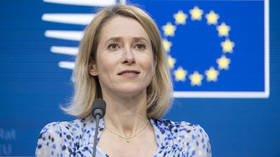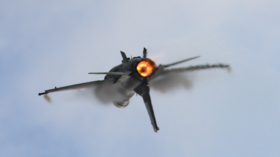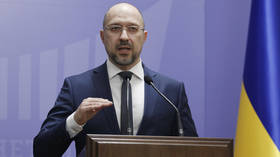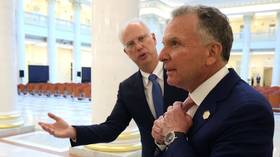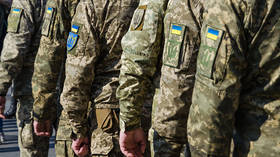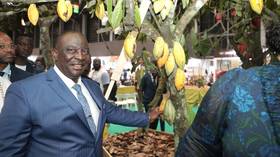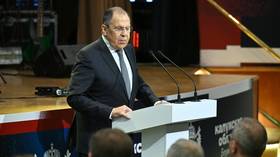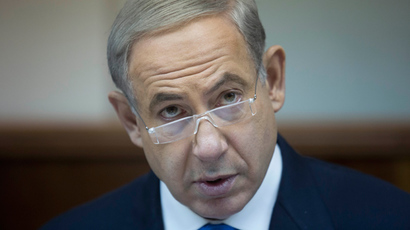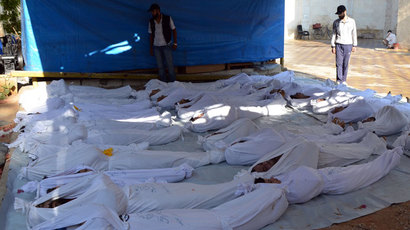Sanctions against Iran ‘unacceptable’ – Russia, China, other SCO nations
Sanctions against Iran are ‘unacceptable’, stated the SCO summit participants. Iranian President Hassan Rouhani said he wants a ‘swift resolution’ to the issue of Tehran's nuclear program, but will not sacrifice its rights for the sake of a solution.
"Regarding the Iranian nuclear issue, we want the swiftest solution to it within international norms," said Rouhani on Friday at a meeting with Russian President Vladimir Putin on the sidelines of the Shanghai Cooperation Organization (SCO) summit in Kyrgyzstan's capital Bishkek.
Iran and the P5+1 group - Russia, China, UK, France, the US and Germany - have held several rounds of talks on a range of issues, with the main focus being on Iran’s nuclear energy program. Some Western countries , mainly United States and Israel presume that the program is aimed at developing nuclear weapons and suggest imposing new sanctions on the Islamic Republic in addition to the existing restrictions on the economy, targeting investments in oil, gas and petrochemicals, exports of refined petroleum products, and others.
The SCO is an intergovernmental security organization that was founded in 2001 in Shanghai by China, Kazakhstan, Kyrgyzstan, Russia, Tajikistan, and Uzbekistan. Iran, Afghanistan, India, Mongolia, and Pakistan, have observer status. The SCO is primarily focused on its member nations' Central Asian security-related concerns, describing the main threats it confronts as terrorism, separatism and extremism.Tajikistan will replace Kyrgyzstan as chair of the SCO during the next summit in 2014.
Particularly, Israel's Ambassador to the International Atomic Energy Agency (IAEA) Ehud Azoulay said on Thursday that the change in Iran's presidency does not mean a "change in their (nuclear) policy," stressing that Tehran continues to seek nuclear arms under its newly-elected President Rouhani.
However, Iran says its nuclear program is aimed at developing energy and medicine, as the country has the right to use nuclear technology for peaceful purposes.
Under the Bishkek declaration signed by the SCO on Friday, the summit member states supported Iran by saying that “the threat of military force and unilateral sanctions against the independent state of [Iran] are unacceptable.”
Putin backed Iran's nuclear energy program in an address to the SCO saying “that Iran, the same as any other state, has the right to peaceful use of atomic energy, including enrichment operations.”
Putin said at the meeting with Rouhani on the sidelines of the summit that Iran was a ‘good neighbor’ adding that Russia hopes for further cooperation with Tehran.
The parties stayed away from discussing the issue of constructing a new building at Iran’s Bushehr nuclear reactor site, said Russian presidential spokesman Dmitry Peskov. The construction of Bushehr - the first civilian nuclear plant in the Middle East - was started in 1975 by German companies, however a contract for finishing the plant was signed between Iran and the Russian Ministry for Atomic Energy in 1995. Bushehr nuclear power plant launched in 2011 has no link to nuclear weapons production and cannot be used to develop such technology.

Rouhani invited his Russian counterpart to Tehran, Peskov said on Friday adding that Putin accepted the invitation, the terms of the visit will be agreed through diplomatic channels.
SCO against Western intervention in Syria
The Syrian crisis almost hijacked the SCO summit, as the member states spoke out “against Western intervention in Syria, as well as the loosening of internal and regional stability in the Middle East,” according to the declaration.
The Russian President welcomed Syria's decision to join the global anti-chemical weapons treaty, saying it showed Damascus was serious in its intention to resolve the conflict.
"I believe we should welcome such a decision," Putin said in his address to the summit. "(It) is an important step towards the resolution of the Syrian crisis, this confirms the serious intention of our Syrian partners to follow this path."
"We believe military interference from outside in the country without a UN Security Council sanction is inadmissible," he stressed. "Promoting the initiative to establish international control over chemical weapons in Syria is of great importance".
Iran supported the Russian initiative to put Syria's chemical weapons arsenal under international control.
"The initiative of the Russian Federation with regard to Syria, as well as steps taken by the Syrian government have given us hope that we will be able to avoid a new war in the region" said Rouhani.
The Iranian President also called for the destruction of all chemical weapons.
“Iran, as the biggest victim of chemical weapons, opposes any production, storage and use of such weapons and calls for the destruction of weapons of mass destruction in the region”.

Rouhani expressed hope that the regional governments could decide the fate of their own countries, adding that “the presence of foreign forces in Afghanistan and other countries sets the stage for extremism in the region.” Under the Bishkek declaration, the SCO countries “emphasized that national reconciliation must be Afghan-led in order to facilitate the early realization of peace and stability in the country".
In addition, the member states reaffirmed their position on the US missile defense system, which, according to them, can cause damage to international security.
"The SCO member states are convinced that you cannot provide for your own security at the expense of others," the joint declaration stated.
Among other issues discussed at the summit, the participants raised the question of security urging against the use of information technology aimed at undermining political and economic security. The countries also emphasized the importance of establishing the SCO Development Fund and the SCO Bank. There was also a call to resume six-party-talks concerning North Korea's nuclear program.



